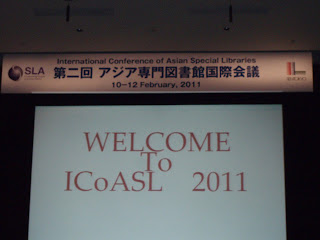




The Second International Conference of Asian Special Libraries (ICoASL) was held in Tokyo, Japan on Feb. 10-12, 2011. The conference theme was "Building User Trust: The Key to special libraries renaissance in the digital era." 170 delegates from the United States, China, Japan, India, Singapore, Korea, Philippines, Sri Lanka, Iran and Indonesia attended the conference.
This was a great opportunity for librarians and information professionals all over the world to communicate, share and learn from each other. Anne Caputo the 2010 SLA president gave a keynote talk "Living in the new normal: global trends all knowledge professionals should understand." Anne is Executive Director of Dow Jones' Learning & Information Professional Programs. Her talk focused on 6 new trends of the information world-globalization, distressed economies, disinter-mediation, invasion of millennials, disruptive technologies and condensed competition. Librarians need to explore the meaning of these global trends and ways that can prepare us to advance our roles and strategic importance within our organizations.
Dr. Xiaolin Zhang, the director of the National Science Library, Chinese Academy of Science, shared how the national library has transformed its services and its organizational make-up into a user-based, problem-solving-driven, customized, knowledge-based service cloud. In order to strengthening its collaborative resource systems and integrated network-based service systems, the national library remodeled users services into "house-librarian" mechanism embedded into research frontlines and hard-binding "team information analyst" system embedded into R&D decision making processes, together with a re-shift into development of user-side information systems. These reformations enable the library to respond to researchers' requests promptly.
From the perspective of user satisfaction, Jin Xiu Guo, a Metadata Librarian at Washington College, Maryland, USA presented a research on geomatics faculty's research behavior and library use at Wuhan University, China. The survey disclosed that the library was still the major source of professional document gathering. The geomatics faculty preferred electronic journals and international conference proceedings in their teaching and research. The survey results also gave suggestions on how to improve the collection development to better serve geomatics faculty.
Xin Li, a Assistant University Librarian for Strategic Initiatives at Cornell University also demonstrated how Cornell University Libraries established international partnership as a solution for meeting user needs.
The conference published the proceedings on CD-ROM, and will make all proceedings free available on ICoASL 2011 website.








